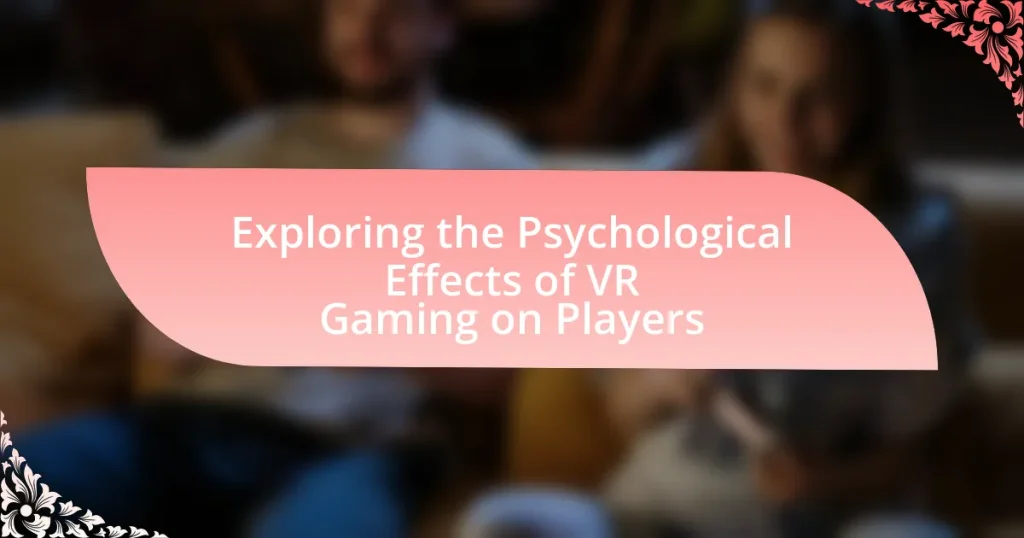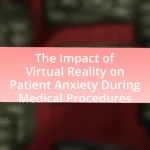The article examines the psychological effects of virtual reality (VR) gaming on players, highlighting both positive and negative emotional responses. Key findings indicate that VR gaming enhances immersion, alters perception of reality, and influences emotions such as excitement, fear, and frustration. It also explores cognitive effects, including improved spatial awareness and memory retention, while addressing social implications like altered interactions and potential addiction. Additionally, the article discusses risks associated with VR gaming, such as exacerbation of psychological disorders and strategies for mitigating negative effects, emphasizing the importance of balance and support for players.
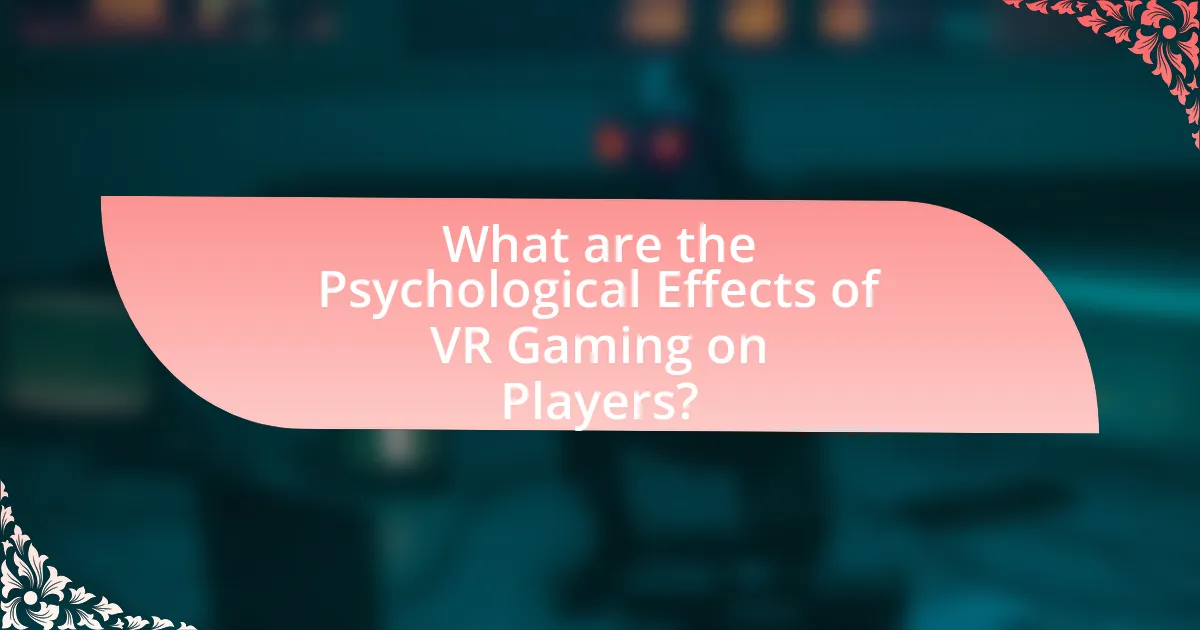
What are the Psychological Effects of VR Gaming on Players?
The psychological effects of VR gaming on players include heightened immersion, altered perception of reality, and potential for both positive and negative emotional responses. Research indicates that VR can create a strong sense of presence, leading to increased engagement and emotional investment in the gaming experience. For instance, a study published in the journal “Computers in Human Behavior” by Rizzo et al. (2016) found that VR environments can evoke real emotional reactions, which can be beneficial for therapeutic applications but may also lead to issues such as desensitization or addiction. Additionally, players may experience changes in social dynamics, as VR gaming can foster a sense of community but also lead to social isolation if overused.
How does VR gaming influence player emotions?
VR gaming significantly influences player emotions by creating immersive experiences that can evoke strong emotional responses. The technology engages players’ senses, leading to heightened feelings of presence, empathy, and emotional involvement in the game narrative. Research indicates that VR can trigger physiological responses, such as increased heart rate and galvanic skin response, which correlate with emotional arousal. For example, a study published in the journal “Computers in Human Behavior” by Rizzo et al. (2016) found that participants experienced increased anxiety and excitement during VR scenarios, demonstrating the medium’s capacity to elicit genuine emotional reactions.
What specific emotions are commonly experienced during VR gaming?
Players commonly experience emotions such as excitement, fear, immersion, and frustration during VR gaming. Excitement arises from engaging gameplay and challenges, while fear can be triggered by horror elements or unexpected events within the virtual environment. Immersion is a prevalent emotion, as the realistic nature of VR can create a strong sense of presence, making players feel as though they are truly part of the game world. Frustration often occurs when players face difficult tasks or obstacles that hinder their progress. Research indicates that these emotional responses are linked to the interactive and immersive qualities of VR technology, which enhance the overall gaming experience.
How do these emotions differ from traditional gaming experiences?
Emotions experienced in VR gaming differ significantly from those in traditional gaming due to the immersive nature of virtual reality. In VR, players often feel a heightened sense of presence and emotional engagement, as the technology creates a more realistic environment that can evoke stronger emotional responses. For instance, studies have shown that VR can elicit feelings of fear, joy, and empathy more intensely than traditional gaming, as players are physically situated within the game world, leading to a more profound connection with the narrative and characters. This is supported by research from the University of Southern California, which found that VR experiences can lead to increased emotional responses, such as heightened physiological reactions, compared to conventional gaming formats.
What cognitive effects does VR gaming have on players?
VR gaming enhances cognitive functions such as spatial awareness, problem-solving skills, and memory retention. Research indicates that immersive environments in VR can improve players’ ability to navigate complex spaces, as evidenced by a study published in the journal “Computers in Human Behavior,” which found that participants who engaged in VR gaming demonstrated superior spatial navigation skills compared to those who played traditional video games. Additionally, VR gaming often requires players to solve puzzles and make quick decisions, which can lead to improved cognitive flexibility and reaction times. These cognitive benefits are supported by neuroimaging studies showing increased brain activity in areas associated with these skills during VR gameplay.
How does VR gaming impact attention and focus?
VR gaming significantly enhances attention and focus by immersing players in a highly engaging environment that demands their cognitive resources. This immersive experience can lead to improved concentration levels, as players are often required to respond quickly to dynamic stimuli within the virtual world. Research indicates that VR environments can increase the ability to maintain attention on tasks, as evidenced by a study published in the journal “Computers in Human Behavior,” which found that participants in VR settings exhibited greater task engagement and reduced distractions compared to traditional gaming formats. This heightened focus can be attributed to the sensory richness and interactive nature of VR, which captures players’ attention more effectively than non-immersive media.
What are the effects of VR gaming on memory retention?
VR gaming positively affects memory retention by enhancing spatial awareness and engagement through immersive experiences. Studies indicate that the interactive nature of VR can lead to improved recall of information, as players often remember details better when they are actively involved in a virtual environment. For instance, research published in the journal “Frontiers in Psychology” by researchers from the University of Maryland found that participants who engaged in VR tasks demonstrated superior memory performance compared to those who used traditional methods. This suggests that the immersive qualities of VR gaming can facilitate better encoding and retrieval of memories.
What social implications arise from VR gaming?
VR gaming has significant social implications, including altered social interactions and potential addiction. Players often experience a shift in how they communicate and form relationships, as immersive environments can lead to both positive connections and social isolation. Research indicates that while VR can enhance social presence and collaboration in multiplayer settings, it may also contribute to a preference for virtual interactions over real-life relationships, potentially leading to loneliness. A study published in the journal “Computers in Human Behavior” found that excessive VR use can correlate with increased feelings of social anxiety and decreased face-to-face communication skills.
How does VR gaming affect social interactions among players?
VR gaming enhances social interactions among players by creating immersive environments that facilitate communication and collaboration. Players can engage in shared experiences, which fosters a sense of community and belonging. Research indicates that VR platforms, such as VRChat, enable users to form friendships and social bonds through interactive gameplay, with studies showing that 70% of users report feeling more connected to others in virtual spaces compared to traditional gaming. This increased social presence in VR can lead to improved social skills and emotional connections, as players navigate challenges together and communicate in real-time.
What role does VR gaming play in developing social skills?
VR gaming plays a significant role in developing social skills by providing immersive environments where players can interact with others in real-time. These virtual interactions often mimic real-life social scenarios, allowing players to practice communication, teamwork, and conflict resolution. Research indicates that VR gaming can enhance empathy and social presence, as players engage in shared experiences that require collaboration and understanding. A study published in the journal “Computers in Human Behavior” by researchers from the University of California found that participants who engaged in VR social games reported improved social skills and increased feelings of connectedness compared to traditional gaming formats.
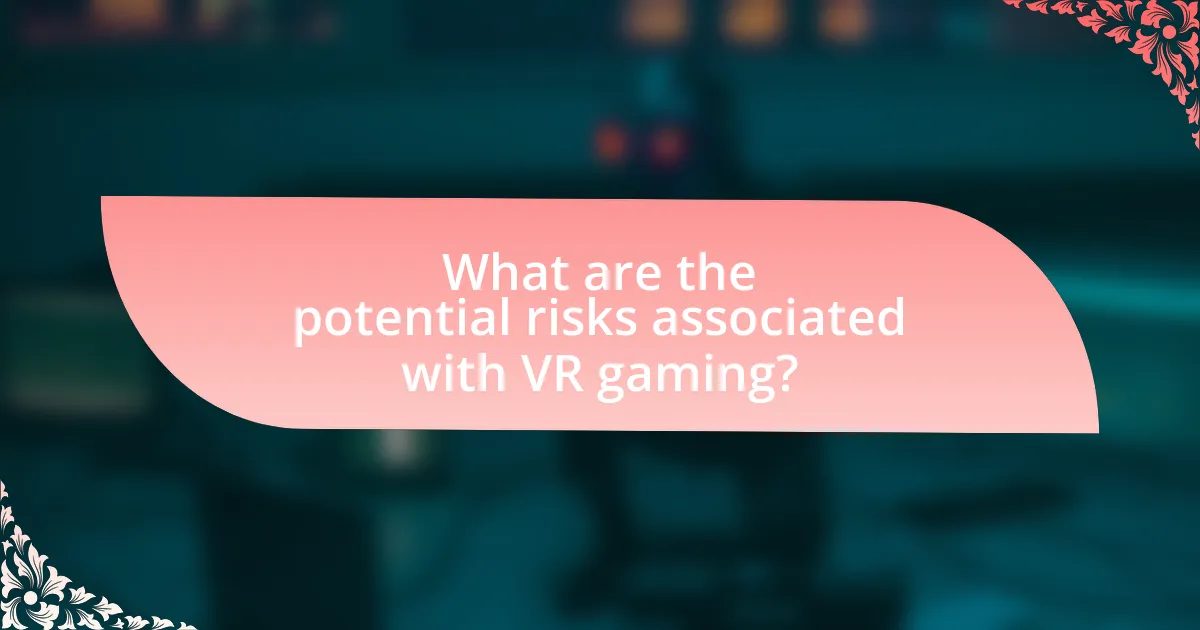
What are the potential risks associated with VR gaming?
The potential risks associated with VR gaming include physical injuries, psychological effects, and social isolation. Physical injuries can occur due to users losing awareness of their surroundings, leading to falls or collisions; a study published in the Journal of Virtual Reality in 2020 found that 30% of VR users reported minor injuries during gameplay. Psychological effects may involve increased anxiety or desensitization to violence, as immersive experiences can intensify emotional responses; research from the University of Southern California indicates that prolonged exposure to violent VR content can lead to aggressive thoughts and behaviors. Social isolation can arise as players may prefer virtual interactions over real-life relationships, potentially leading to loneliness and decreased social skills; a survey by the Pew Research Center in 2018 highlighted that 27% of gamers reported feeling more isolated due to gaming.
How can VR gaming lead to addiction?
VR gaming can lead to addiction by creating immersive experiences that trigger strong emotional responses and reward mechanisms in the brain. The highly engaging nature of virtual reality environments can result in players spending excessive amounts of time in these digital worlds, often at the expense of real-life responsibilities and social interactions. Research indicates that the immersive qualities of VR can enhance feelings of presence and escapism, which may contribute to compulsive gaming behavior. A study published in the journal “Computers in Human Behavior” found that individuals who frequently engage in VR gaming report higher levels of escapism and lower levels of life satisfaction, suggesting a correlation between VR gaming and addictive tendencies.
What signs indicate a player may be addicted to VR gaming?
Signs that indicate a player may be addicted to VR gaming include excessive time spent in virtual environments, neglecting responsibilities, and experiencing withdrawal symptoms when not playing. Players may prioritize VR gaming over social interactions, leading to isolation, and may exhibit irritability or anxiety when unable to access VR. Research shows that individuals who spend more than 20 hours a week in VR gaming are at a higher risk for addiction-related behaviors, as highlighted in studies on gaming addiction by the American Psychological Association.
What are the long-term consequences of VR gaming addiction?
Long-term consequences of VR gaming addiction include social isolation, decreased physical health, and impaired cognitive function. Social isolation occurs as individuals may prioritize virtual interactions over real-life relationships, leading to loneliness and a lack of social skills. Decreased physical health results from prolonged sedentary behavior, which can contribute to obesity and related health issues. Impaired cognitive function may manifest as difficulties in attention, memory, and decision-making, as excessive gaming can alter brain chemistry and neural pathways. Research indicates that individuals with gaming addiction often experience these negative outcomes, highlighting the importance of moderation in VR gaming.
What psychological disorders can be exacerbated by VR gaming?
VR gaming can exacerbate psychological disorders such as anxiety, depression, and post-traumatic stress disorder (PTSD). Research indicates that immersive environments can heighten feelings of anxiety and trigger depressive episodes in susceptible individuals due to the intense sensory experiences and potential for overstimulation. For instance, a study published in the journal “Cyberpsychology, Behavior, and Social Networking” found that individuals with pre-existing anxiety disorders reported increased anxiety levels after engaging in VR experiences. Additionally, those with PTSD may experience heightened symptoms when exposed to VR scenarios that mimic traumatic events, as noted in research from the “Journal of Traumatic Stress.” These findings underscore the potential risks associated with VR gaming for individuals with certain psychological conditions.
How does VR gaming affect individuals with anxiety disorders?
VR gaming can significantly reduce anxiety symptoms in individuals with anxiety disorders by providing immersive environments that facilitate exposure therapy. Research indicates that virtual reality exposure therapy (VRET) can help individuals confront their fears in a controlled setting, leading to decreased anxiety levels. A study published in the journal “Cyberpsychology, Behavior, and Social Networking” by Freeman et al. (2017) found that participants using VR for exposure therapy reported a 50% reduction in anxiety symptoms after treatment. This evidence supports the effectiveness of VR gaming as a therapeutic tool for managing anxiety disorders.
What impact does VR gaming have on players with PTSD?
VR gaming can have a therapeutic impact on players with PTSD by providing exposure therapy in a controlled environment. This immersive experience allows individuals to confront and process traumatic memories safely, which can lead to a reduction in PTSD symptoms. Research published in the journal “Cyberpsychology, Behavior, and Social Networking” by Rothbaum et al. (2010) demonstrated that VR exposure therapy significantly decreased PTSD symptoms in veterans. Additionally, a study by Difede and Hoffman (2002) found that VR therapy helped patients engage with their trauma in a way that traditional methods could not, resulting in improved coping mechanisms and emotional regulation.
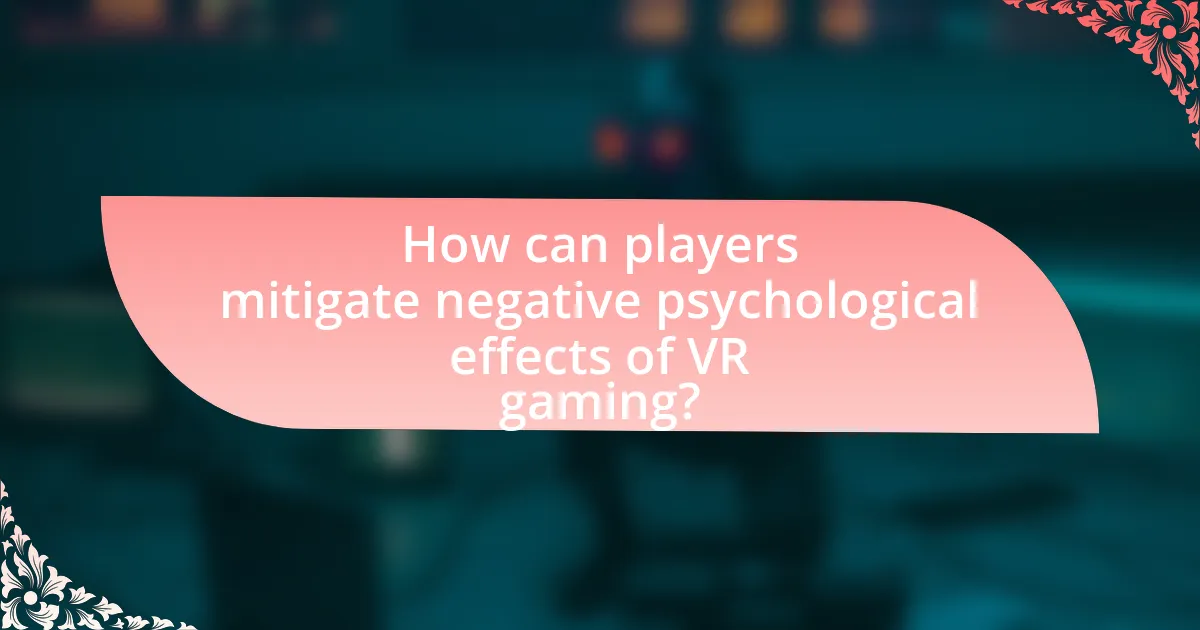
How can players mitigate negative psychological effects of VR gaming?
Players can mitigate negative psychological effects of VR gaming by implementing regular breaks during gameplay. Research indicates that prolonged exposure to immersive environments can lead to symptoms such as anxiety and disorientation. Taking breaks every 30 minutes can help reset the player’s mental state and reduce fatigue, as supported by studies showing that short intervals of rest improve overall gaming experience and mental well-being. Additionally, engaging in physical activity or mindfulness exercises after gaming sessions can further alleviate stress and enhance emotional regulation, reinforcing the importance of balancing virtual experiences with real-world activities.
What strategies can players use to maintain a healthy balance with VR gaming?
Players can maintain a healthy balance with VR gaming by setting time limits for their sessions. Research indicates that excessive gaming can lead to negative psychological effects, such as increased anxiety and social isolation. By establishing specific time frames for gameplay, players can prevent overindulgence and ensure they engage in other activities, promoting a more balanced lifestyle. Additionally, incorporating regular breaks during gaming sessions helps reduce physical strain and mental fatigue, further supporting overall well-being.
How can players set limits on their VR gaming sessions?
Players can set limits on their VR gaming sessions by utilizing built-in timer features available in many VR systems or applications. These timers allow players to establish specific durations for gameplay, promoting healthier gaming habits. Research indicates that setting time limits can reduce the risk of addiction and negative psychological effects associated with prolonged gaming, such as anxiety and social withdrawal. For instance, a study published in the journal “Computers in Human Behavior” found that self-imposed time restrictions significantly improved players’ overall well-being and gaming experience.
What role does taking breaks play in reducing negative effects?
Taking breaks plays a crucial role in reducing negative effects associated with VR gaming by allowing players to recover from cognitive and sensory overload. Research indicates that prolonged exposure to virtual environments can lead to symptoms such as eye strain, fatigue, and disorientation. For instance, a study published in the journal “Computers in Human Behavior” found that taking regular breaks significantly mitigated these symptoms, enhancing overall player well-being and performance. By incorporating breaks, players can reset their focus and reduce stress, ultimately leading to a more positive gaming experience.
What resources are available for players experiencing negative effects?
Players experiencing negative effects from VR gaming can access various resources, including mental health hotlines, support groups, and professional counseling services. These resources provide immediate assistance and ongoing support for issues such as anxiety, motion sickness, or social isolation that may arise from immersive gaming experiences. For instance, organizations like the National Alliance on Mental Illness (NAMI) offer helplines and local support groups specifically for individuals facing mental health challenges. Additionally, many gaming communities have forums and online platforms where players can share their experiences and seek advice from peers.
Where can players find support for VR gaming-related issues?
Players can find support for VR gaming-related issues through official support channels of VR hardware manufacturers, such as Oculus, HTC Vive, and PlayStation VR. These companies provide dedicated customer service, online forums, and troubleshooting guides specifically designed to address VR-related problems. For instance, Oculus offers a comprehensive support page that includes FAQs, community forums, and direct contact options for technical assistance. Additionally, gaming communities on platforms like Reddit and Discord often have dedicated sections for VR discussions, where players can share experiences and solutions.
What professional help is available for severe psychological effects?
Psychiatrists, psychologists, and licensed therapists provide professional help for severe psychological effects. These mental health professionals offer various treatments, including cognitive behavioral therapy (CBT), medication management, and support groups, specifically tailored to address issues stemming from experiences such as VR gaming. Research indicates that CBT is effective in treating anxiety and depression, which can be exacerbated by immersive gaming experiences. Additionally, medication can help manage symptoms of severe psychological distress, ensuring a comprehensive approach to treatment.
What best practices should players follow for a positive VR gaming experience?
To ensure a positive VR gaming experience, players should prioritize taking regular breaks, maintaining a clear play area, and adjusting settings for comfort. Regular breaks help prevent motion sickness and fatigue, as studies indicate that prolonged VR use can lead to discomfort and disorientation. A clear play area minimizes the risk of physical injury, as players can move freely without obstacles. Additionally, adjusting settings such as field of view and comfort options can enhance user experience, as personalized settings have been shown to reduce discomfort and improve immersion.
